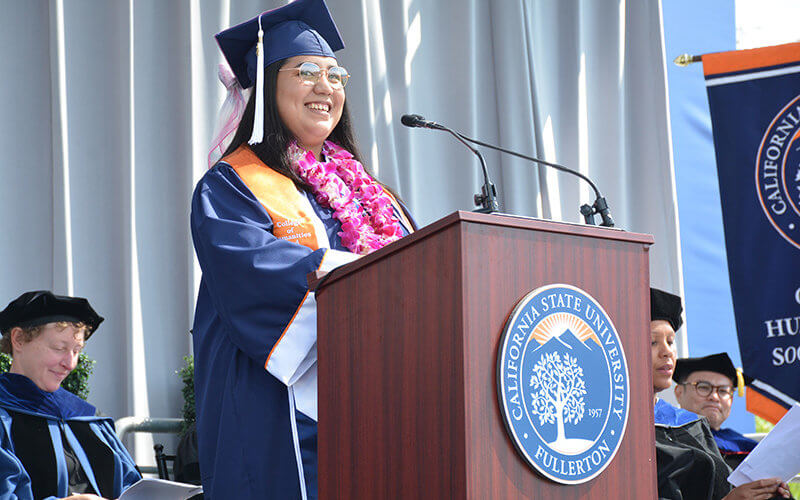
Marisela Dorado, B.A. ethnic studies-Chicana and Chicano studies
I’m honored to be here with you all today as we finish our time here at Cal State Fullerton. Es un honor estar con todos ustedes hoy. Los pasados dos años han sido difíciles. Our educational system changed through the pandemic and we were challenged with the task of carrying on. But, what remained the same through all the uncertainty was the joy I felt being part of the Chicana/o/x Studies department.
Alegría. Esa palabra normalmente no está asociada con el departamento de Estudios Chicana/o/x.
La mayoría del tiempo los temas que discutimos pueden ser dolorosos y nos llenan de furia y tristeza. Nevertheless, talking about the segregation of brown children in the ’40s, the Chicano movement in the ’60s, and the Latinx immigration struggles in our present day allow us to shine light on our stories.
There is joy in finding a space that allows us to openly speak about topics that affect and connect us in many ways. The humanities building has become representative of the space of belonging I’ve found with the Chicana/o/x Studies department. While the humanities building has old white walls and windowless classrooms, the third floor is where I always stop to take a breath. Platicaba con mi familia de cuánto extrañaba estar en clase y cuando al fin regrese sentí consuelo y paz. Después de un año y medio en línea, pasando tiempos difíciles, quería regresar a un espacio que extrañaba, donde me sentía cómoda. As I pass room 322 I am filled with joy remembering the courses I’ve taken in that classroom. Where in Ethnic Studies 101 I decided that finding my happiness meant changing majors from art to Chicana/o/x Studies. It’s a space where we have professors and faculty that support us as students and humans.
Dr. Obando, Dr. Alvarez and Dr. Woody are a few examples of the professors who have shown me patience and kindness as I navigate my academic journey through a pandemic. It has also been a place where I’ve met and connected with so many of you. En este espacio compartimos nuestras pasiones por los estudios Chicana/o/x, la necesidad de justicia social y nuestro poder para causar cambio. En este espacio confiamos unos en otros, encontrando consuelo en nuestras situaciones similares. Esto es lo que me da alegria. This is what sparks my joy. These seemingly insignificant moments of understanding and connecting put a smile on my face, lift my spirit and make me feel in community; proving that Chicana/o/x Studies provides space for us to be our whole selves and that no small moment in community is insignificant, it’s joy. Es alegria.
Soy orgullosa de ser Chicana. Soy hija de inmigrantes mexicanos. Saludos a mi mamá Luciana Guerrero y a mi papa Cenaido Dorado que me acompañan hoy. Espero poder continuar contando las historias de nuestros antepasados, me esforzaré por crear un cambio en el presente y mirar hacia el futuro que juntos podemos crear.
I’m thankful to the friends and family who have supported me these past few years. I’m standing here today because you’ve shown me patience, kindness, and love. I’d like to share a quote by Thich Nhat Hanh that I first read last fall in Dr. Obando’s CHIC 367 course: “When we have anger in us, we suffer. When we have discrimination in us, we suffer. When we have the complex of superiority, we suffer. When we have the complex of inferiority, we suffer also. So when we are capable of transforming these negative things in us, we are free and happiness is possible.”
I wanted to leave you with these words in the hope that Chicana/o/x Studies has taught you how to transform negativity into joy and that you continue to find joy wherever your journey may lead.